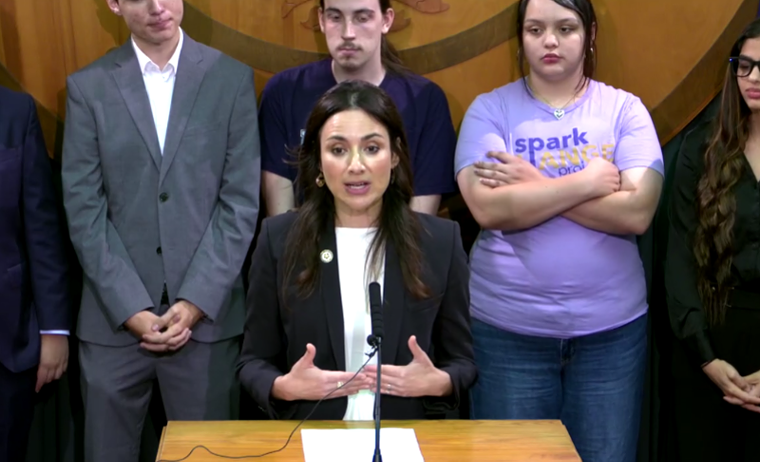Texas House Votes to Eliminate Unpopular STAAR Test
Lawmakers on both sides of the aisle, along with many educators and students, have tried for years to get rid of the State of Texas Assessments of Academic Readiness but some remain skeptical of a proposal to replace the exam with three smaller tests staggered throughout the year, a measure that passed the state House on Tuesday.
Proposals from Sen. Paul Bettencourt, R-Houston, and Rep. Brad Buckley, R-Salado, aim to eliminate the STAAR test and instead require students to take less intense “support” exams at the beginning, middle and end of the school year. Results would be available within 48 hours, providing teachers with “timely data to adjust their instruction,” according to the bill authors.
The new law, if signed by Gov. Greg Abbott, would become effective for the 2027-28 school year. The Legislature attempted to eliminate the STAAR test earlier this year but lawmakers in the House and Senate couldn’t agree on a final version of the bill. The matter was placed on a special session agenda among dozens of other items.
Buckley’s bill passed the House on Tuesday, 78 to 58. The Senate passed the bill earlier this month but will have to do so again under the second special session that began August 15.
One point of contention is whether the Texas Education Agency will have a role in administering and crafting the new tests, which will be based on a rigid set of criteria known as Texas Essential Knowledge and Skills. Some state representatives brought this up during a floor debate Tuesday.
Rep. Gina Hinojosa, D-Austin, proposed that the tests be written by a third party and balked at the power given to TEA. Rep. Diego Bernal, D-San Antonio, who serves as the vice chair of the Public Education Committee, asked that a decision be delayed, arguing that Buckley’s latest iteration with amendments was confusing and many lawmakers hadn’t had time to read it.
“It’s too big; it’s too complicated; and it’s too important,” Bernal said. “Let’s not pass this bill now. Let’s create a commission made up of House members, Senate members, and governor appointees to work together and emerge from that process with something that we can all support and agree on.”
Hinojosa has said it will cost taxpayers $50 million for TEA to redesign the program. Buckley explained that the long implementation period is needed to ensure that the state, not the individual school districts, absorb additional costs.
“This bill replaces the STAAR test and it reforms our Texas assessment program and strengthens the state’s accountability system while creating greater transparency, oversight, and ultimately, predictability for our public schools,” Buckley said.
“Members, our system is in need of reform,” Buckley added. “We’re in a position where districts see our school accountability ratings as broken and they have resorted to suing the state over these issues. House Bill 8 is our opportunity to change this and solve this problem. If we fail to act and pass meaningful reforms, we will remain in the same place where we’ve been for the past 13 years.”
Texas Rep. Gina Hinojosa, D-Austin, held a press conference Monday asking voters to oppose legislation that would replace the STAAR test with three shorter exams staggered throughout the school year.
Screenshot
Hinojosa held a press conference Monday with Austin ISD students outlining why Buckley’s House Bill 8 isn’t a good solution and asking voters to contact their state reps to try to kill the bill.
“[The bill] creates more testing at a time when we hear constantly from parents and teachers in our neighborhood public schools that we need less testing,” said the state representative, a former Austin ISD school board member.
Austin ISD student Conner Praba said the STAAR test is broken and it doesn’t make sense to triple the stress, anxiety and amount of time devoted to preparing for it.
“For what? So the TEA can shut down our neighborhood schools?” he said. “So the TEA can dictate what we learn, when we learn, and how we learn it? What HB 8 does is a whole lot of nothing good. It perpetuates a broken system of testing.”
Hinojosa also pointed out that the bill would typically be the kind of legislation that would keep lawmakers at the Capitol late into the night, hearing public testimony. Because of the timing, as kids were returning back to school, there was very little input from advocacy groups and almost no input from public school parents, the representative said.
“I think we could guarantee a better bill written by these students to evaluate their performance than we have currently with House Bill 8,” she said at the press conference. “I’ve told the story of my own son who tried to run away in second grade because of the stress of preparation for a third-grade STAAR. We’ve heard that reinforced here today. Our kids do not want more testing. Parents do not want more testing for our kids.”
“Our message to Governor Abbott and [TEA Commissioner] Mike Morath is to leave our kids alone,” she added.
Those in favor of the bill, including the advocacy group Texas Freedom Alliance, say Buckley’s House Bill 8 “marks a historic shift for Texas education,” ending the high-stakes one-size-fits-all STAAR testing and replacing it with instructionally supportive assessments that “measure real learning and return accountability to local school districts.”
Mary Lynn Pruneda, director of education and workforce policy at Texas 2036, a nonprofit, nonpartisan research and advocacy organization, said House Bill 8 is geared toward readying students for success in the classroom and for life after graduation.
“By providing parents with accurate, regular and timely updates on their children’s academic performance, this legislation would give them the information they can count on to make good decisions to support learning outside the classroom,” she said.
Buckley said the bill addresses “every single point” that districts raised in lawsuits against the state. “House Bill 8 increases legislative oversight of the accountability system and updates the accountability rules in the form of reports due to the legislature,” he said.

Reign Bowers is an outdoor enthusiast, adventure seeker, and storyteller passionate about exploring nature’s wonders. As the creator of SuperheroineLinks.com, Reign shares inspiring stories, practical tips, and expert insights to empower others—especially women—to embrace the great outdoors with confidence.





Post Comment